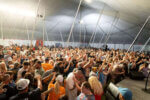Chinese authorities claim unregistered house-church groups in China are
“evil religions.”
If some readers think I am writing too much about China, I apologize. The situation of Christians in China has engrossed me for decades, and I have even written a book about it, Jesus in Beijing (Regnery, 2003). But I feel compelled to write again because that country currently is conducting the fiercest crackdown on house-church Christians in 20 years–and because the only people able to defend them are those of us outside China who are concerned about it.
Moreover, the Chinese government is cynically using legal regulations established to suppress the Falun Gong meditation movement and wicked, quasi-Christian cults as a way to suppress Christian leaders and groups who are wholly orthodox in the broadest Christian sense.
The latest house-church leader to be detained and held for questioning (almost certainly accompanied by beatings and possibly torture) is Zhang Rongliang, a longtime leading figure in one of the largest house-church networks of all, the Fangcheng fellowship.
I first met Zhang, 53, in 1998 in Zhengzhou, Henan province, when he was meeting with several other house-church leaders to try and agree with them on a united appeal to the government. They did in fact produce a document, United Appeal of the Various Branches of the Chinese House Church, which subsequently was published and made available to government bodies.
Zhang was obviously a gifted leader. (He was also charismatic in the theological sense.) One of his concerns was the tendency of the Chinese authorities to suppress unregistered house churches on the grounds that they were “cults” (the Chinese term for “cult” translates as “evil religion”).
The government routinely labeled as “cult” any group that preached the Second Coming (regardless of when they thought it might occur) or practiced prayer for healing. In an effort to combat this utterly cynical mislabeling, Zhang and other house-church leaders held additional meetings to see if they could hammer out a sort of Augsburg Confession of house-church Protestantism in China. In November 1998, Zhang and three others signed a very carefully composed new document, titled Confession of Faith (which is published along with United Appeal in Jesus in Beijing).
Its purpose was simple: to demonstrate, once and for all, that the major house-church movements in China, regardless of minor differences in doctrine, held together on the essentials of a thoroughly orthodox set of Protestant doctrines. The preamble of the Confession clearly stated that it had been composed “to let the government and the Chinese public understand the positions of our faith, [and] in order to distinguish ourselves from heresies and cults.”
Despite such efforts by China’s house churches to distinguish themselves from a set of truly strange cults swirling through China, the government since at least June 2003 has relentlessly tried to suppress as many house-church leaders as it can locate by arresting them, beating them and, on occasion, torturing them to death.
Premier Wen Jiabao even signed a new administrative order in November, titled Decree No. 426 of the State Council, intended supposedly “to thoroughly implement the constitutional principle of ensuring citizens’ freedom of religion.” In fact, however, the new document serves to paper over bureaucratically the continuing assault on house-church Christians.
There are at least two dangerous, quasi-Christian cults in China, Lightning From the East and Three Grades of Servant. Both are entirely heretical and engage in violence against legitimate house-church Christians as well as each other.
But by deliberately muddying the waters and claiming that all unregistered house-church groups in China are “evil religions,” the Chinese authorities are making it harder for real Christians to protect themselves from cults and for ordinary citizens to know the difference. Pray for Zhang Rongliang and China’s Christians and learn more by visiting such Web sites as www.chinaaid.org.






Leave a Comment
You must be logged in to post a comment.